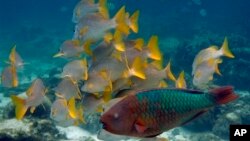About 400 scientists, researchers, environmentalists and government policymakers from 90 nations gathered in Washington this month to discuss pollution, over-fishing and acidification in the world’s oceans, and ways to address them. Among those in attendance was an internationally-known marine scientist from Cuba, the first such official invited to attend a U.S. government-sponsored event.
Covering three-quarters of the globe, earth’s oceans are our most important shared resource. Billions of people rely on them for food security, they are essential for scientific research and human health, and their vast ecosystem regulates climate and weather. These resources are now under siege, however, threatened by various human activities.
Pollution, especially chemical pollution by agricultural nutrient runoff, is helping create oxygen-depleted dead zones where marine life cannot exist. Commercial fishing operations are seriously over-harvesting fish stocks. Climate change and air pollution are causing life-killing changes in ocean chemistry by raising its acidity. With so much at stake and the scope so broad that no one person or country can take protective action alone, it is imperative for the international community to work cooperatively to protect and sustain the oceans.
The “Our Oceans” conference provided participants with an opportunity to share research, individual perspectives and best practices in marine conservation. The director of Cuba’s Center for Coastal Ecosystems Research, Fabian Pina Amargos, works with U.S. non-governmental organizations and researchers from other countries in cooperative marine conservation efforts.
The marine ecosystem in Cuba is vital for U.S. interests for its fish stocks and migratory species, and provides a valuable resource for scientists. Sharing information on the scientific research in the waters shared by our two nations will benefit both countries, as well as the environment.
Cuban participation in the “Our Oceans” conference is consistent with our nation’s promotion of peaceful, democratic change within the island nation through people-to-people contacts and targeted bilateral engagement that advances compelling U.S. national interests.
















